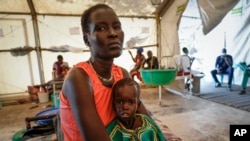South Sudan is witnessing “the worst hunger crisis to date.” That’s the assessment of U.N. World Food Program’s Marwa Awad, who sees it firsthand.
An estimated 8.3 million people in South Sudan will face extreme hunger in the coming months as the lean season peaks and provisions are depleted, Awad told South Sudan in Focus.
“Over 8 million people are extremely hungry, and this includes tens of thousands who could starve if we are unable to reach them with food assistance,” she said. “We are seeing people’s resilience fading in the face of the ongoing conflict, the floods, and rising food prices.”
The WFP has programs to build people's resilience and restore their livelihoods, Awad said, “but we need the funding to scale up and reach more people.”
Some families in Jonglei state told VOA they struggle to put food on table after last year's floods destroyed their land.
Bor resident Kec Magok Muoth, 45, who has six daughters, said the unprecedented flash floods destroyed farms, while inter-communal fighting has prevented fellow Jonglei state residents from cultivating fields.
The family had long survived mostly on WFP food rations, which were cut six months ago. Muoth said she has since resorted to cultivating a small vegetable garden to bring in a bit of money to buy food.
“The U.N. provided food; you cannot defend it only now because it has been cut. [With income slashed,] now only two of my children are in school,” Muoth said.
Her husband, a soldier in Akobo, does not earn enough money to support the family, she said.
Another factor shrinking what is on their plates is the soaring prices at the market.
“Two weeks ago, two liters of oil was 4,000 South Sudanese pounds, but now it costs 5,000 SSP. A sack of sugar used to be 15,000 SSP but it is now 20,000. This increase is too much,” she said.
Bor resident Abuol Malual, 60, told South Sudan in Focus she is unable to farm because of an illness and said the WFP food rations are too small to support her.
“There is nothing else, but the [rations provided to] elderly people such as me who have no children to support them are likely to starve, so I appeal to the U.N. to listen and increase the rations so that we survive,” said Malual.
The WFP last year announced it would suspend food assistance for more than 100,000 displaced people in areas of South Sudan as part of what it called a prioritization exercise driven by funding shortages.
Adeyinka Badejo, WFP’s South Sudan deputy country director said last week that the impact of the climate crisis and ongoing regional conflict has led to large scale displacement, loss of livelihood, the destruction of arable land and crops, as well as rising food prices, threatening the survival of communities in Jonglei, Lakes, Unity and Warrap states.
Awad said South Sudan forms part of a “ring of fire” encircling the globe where climate shocks, conflict, the pandemic and rising prices are driving millions of people closer to starvation.




